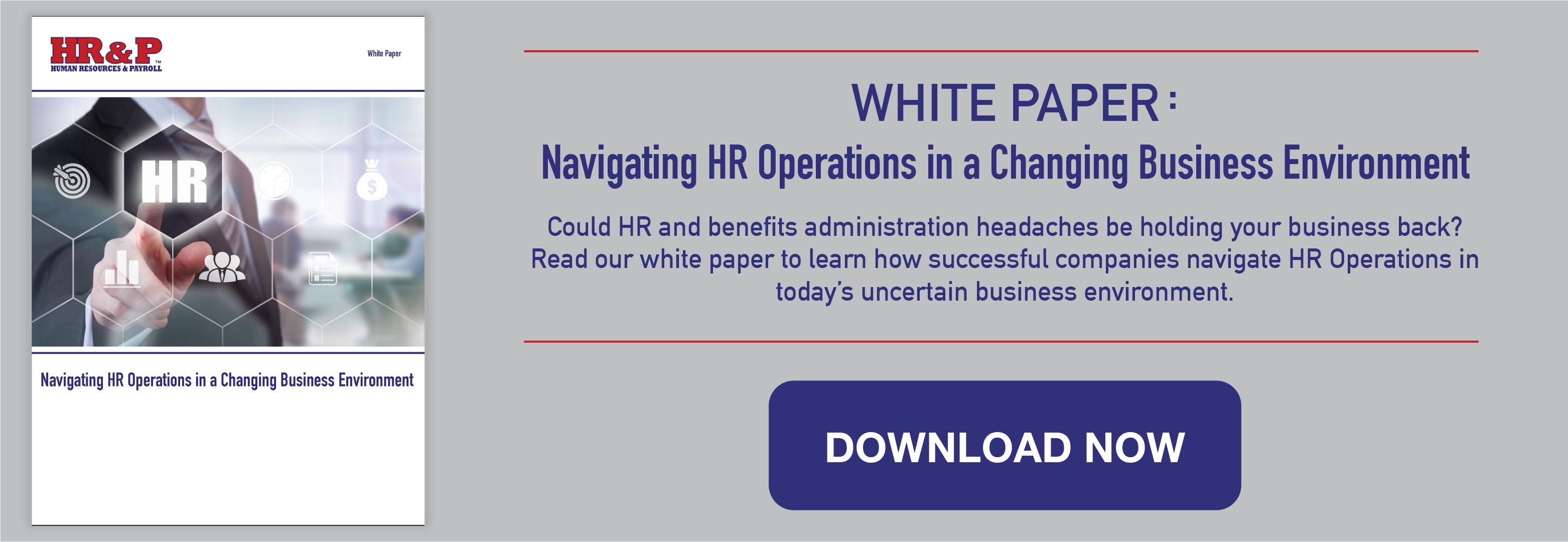“Action and adaptability create opportunity.”
—Garrison Wynn
Did you know?
- The U.S. Dept of Labor is currently asking for public comment on potential changes to the overtime rule to determine which employees are exempt from minimum wage and overtime requirements of the Fair Labor Standards Act (FLSA)? (SHRM)
- A revised version of form I-9, employment eligibility verification, is now available. As of Sept. 18, this version will be the only one the government will accept. (S. Citizenship and Immigration Services)
- A vote to pass a scaled-back overhaul of the Affordable Care Act (dubbed a “skinny repeal” bill) failed to pass in the U.S. Senate. (The Washington Post)
Did you also know that all of these developments happened in the month of July alone?
Keeping informed of evolving HR legislation is a daunting task for any HR professional. If you’re a company who is trying to keep on top of all your own HR administration, including payroll and benefits compliance, staying in the know and preparing for possible outcomes can seem like an endless effort. From rules about employee health benefits to changes in immigration law, it would be easy to lose track of the latest developments in HR legislation.
Here are four areas of HR you need to keep your eye on:
1. Employee Classification/Status
Generally employees who are classified as “exempt” do not qualify for minimum wage requirements, overtime pay and other rights. These employees—often executives, supervisors, professionals, and outside sales people—must receive a salary. When you classify a job as “non-exempt,” you’re required to follow the requirements laid out in the Fair Labor Standards Act, such as paying employees the federal minimum wage plus overtime (not less than one and half times their hourly rate) if their hours exceed the typical 40-hour work week.
Failing to follow these rules can result in expensive and embarrassing employee lawsuits. Just ask recent litigants Burberry, TJX (parent company of T.J. Maxx, Marshalls and Home Goods stores), and Lowe’s. All three retailers were hit with lawsuits for failing to adhere to the FLSA and reached hefty settlement agreements in 2017.
- In the case of Burberry, workers in New York State alleged that they were not paid overtime wages. The company reportedly settled for $2.54 million.
- Disgruntled T.J. Maxx employees claimed that they were made to wait around off the clock until their managers closed their stores and to forgo meal breaks. That suit resulted in an $8.5 million settlement.
Further muddying the waters, potential changes to the overtime rules may change which employees should be classified as exempt based on a higher salary threshold ($47,476, up from $23,660 per year). Although this rule was initially stopped by a federal injunction at the end of 2016, as of this writing, the Department of Labor has released a Request for Information (RFI) that suggests the DOL is still exploring the rule.
Misclassifying employees as either contractors or full-time employees is also a very common HR mistake, and it affects companies of all sizes and across industries. According to the Economic Policy Institute, “Numerous state-level studies show that between 10 and 20 percent of employers misclassify at least one worker as an independent contractor.” This problem used to be most prevalent in such areas as construction and trucking. But with the rise in on-demand workers in tech, transportation, etc., the lines between contractor and FTE can blur.
- The popular home improvement chain Lowe’s was accused of misclassifying window and door installers as independent contractors. They’re looking at a $2.85 million settlement.
2. Employment Eligibility Verification
For companies who do all or the majority of their business in Border States like Texas, immigration and employment eligibility verification are vital to their remaining HR compliant. This includes making sure you correctly fill out the I-9 form within 3 days of a new hire starting work and that the employee supplies acceptable supporting documentation.
As we mentioned above, there is a new version of the I-9 form that, as of 9/18, will be the only version the federal government will accept. Also important to note is a recent increase in the number of I-9 workplace audits conducted by the Immigration and Customs Enforcement (ICE) agency, making it even more of an imperative to have every employee’s I-9 forms in order. If you don’t do your due diligence, fines in the thousands of dollars and, in extreme cases, even jail time can result.
3. Affordable Care Act (ACA)
Much has been written about how to remain compliant with the ACA, otherwise known as Obamacare. In the past six months, many companies have been wondering about the ultimate fate of this federal statute, and if it might be repealed. However, recent events suggest that it is here to stay—at least for now.
Companies taking a wait-and-see attitude should know that the Treasury Inspector General for Tax Administration (TIGTA) has issued a report, “Assessment of the Efforts to Implement the Employer Mandate under the Affordable Care Act.” The report reveals that the IRS has developed a system “for identifying potentially non-compliant employers, and the system has a very wide reach.” Those companies who have 50 or more employees who are not compliant with the Employer Mandate should expect to receive notice of a stiff penalty. (HR Morning)
So if you aren’t ACA-compliant, now is the time to bring your attention back to your 1095 forms—before an auditor does. Even being late is better than not filing at all.
4. Ban the Box
Most employment applications include a box for applicants to check if they have ever been convicted of a felony. Ban the Box is the name of an international campaign that is encouraging companies to remove this box from job applications to allow individuals with prior convictions who have served their time the chance to secure valid employment. Questions about a candidate’s criminal history would be delayed until a conditional job offer was extended and a criminal background check ordered. According to BantheBoxCampaign.org, over 45 cities and counties have removed the box from state and local job applications, and seven states have changed their hiring practices in public employment. That number is expected to increase, so it’s important to remain aware of the rules about the felony box in your jurisdiction.
Change is the only constant in life…and in business
Changes in the regulatory environment are a fact of business. Keeping on top of (and understanding how to stay compliant) with new regulations can be a full-time job. Having an HR partner who can help keep you up to date on changes to the law and advise you on how to properly fill out forms or answer your employees’ questions when new regulatory issues pop up can be your secret weapon for remaining adaptable. With an uncertain political climate, a competitive job market and evolving thinking about what an employee should expect from their employer, you can expect even more change to come. So get ready.
If you have questions about these or other common HR risks your organization may face, or you would like to learn more about how HR&P can help, please contact us.
TESTIMONIALS
As we’ve grown, so have our administrative and payroll needs. That’s why we’ve partnered with HR&P. HR&P supports us every day with human resources, payroll, benefits and compliance so we can focus on being the best BB’s Cafe we can be!
Since 2010, my company has grown to over five hundred employees. With our tremendous growth we needed a human resources and payroll company that could grow with us. That company is HR&P. And as laws have changed, like the Affordable Care Act, HR&P has kept us in compliance. I focus on growing Twin Eagle. I trust HR&P with the rest.
We are the industry leader in Oil Spill Cleanup Products and have dealt with numerous Oil Spill disasters. Knowing up close what a disaster looks like we choose to avoid them in our offices. HR&P guides us through the land mines of HR, Payroll and Benefit compliance so my team can focus solely on helping our clients with their problems, and we avoid our own.
One of the best things we did for our business was to partner with HR&P. They’re the experts in human resources, payroll and benefits administration.
HR&P’s web based solutions make it easy for us to manage our employee’s needs. They also help us stay compliant with the Affordable Care Act and with “the alphabet soup” of constantly changing Governmental regulations.
I run a restaurant, from early in the morning to late at night, our team works hard to deliver great food in a fun atmosphere.
But there’s a lot more to running a business like human resources, payroll, benefits and compliance. So we turn to HR&P.
Outsourcing to HR&P keeps us focused on our business.
NEWSLETTER
To receive more HR articles and tips that keep you informed, sign up for our newsletter.


